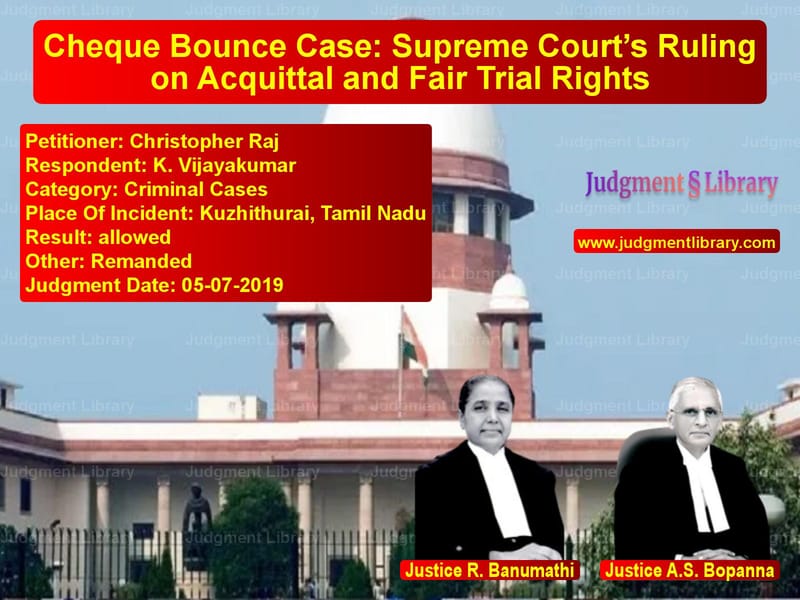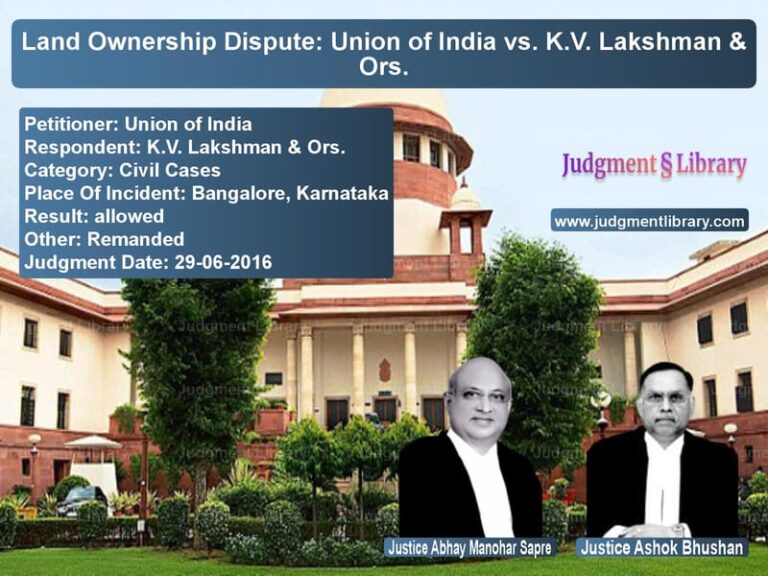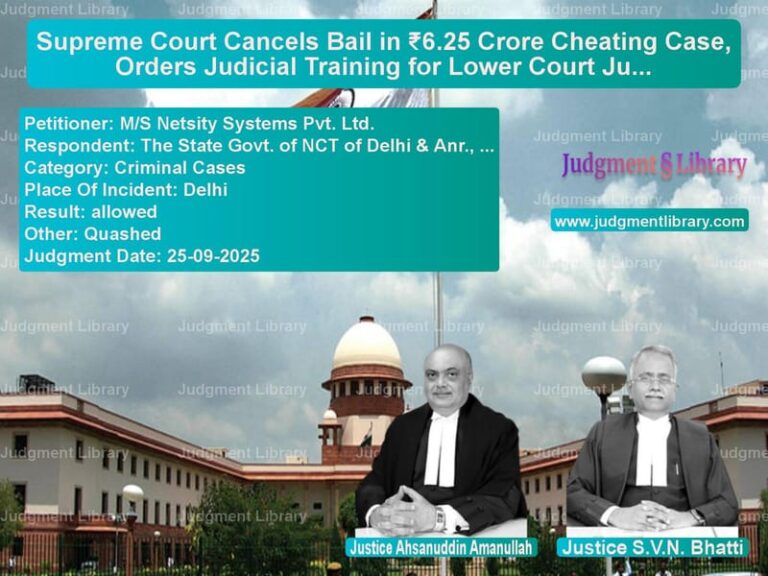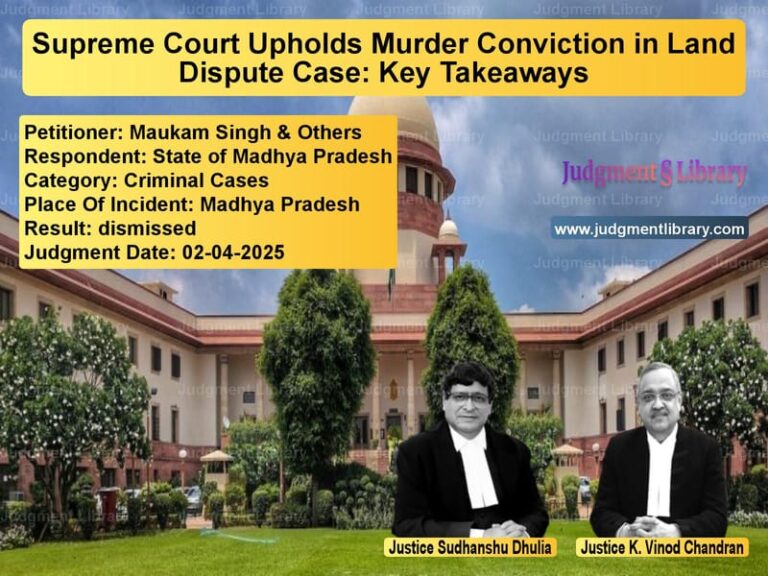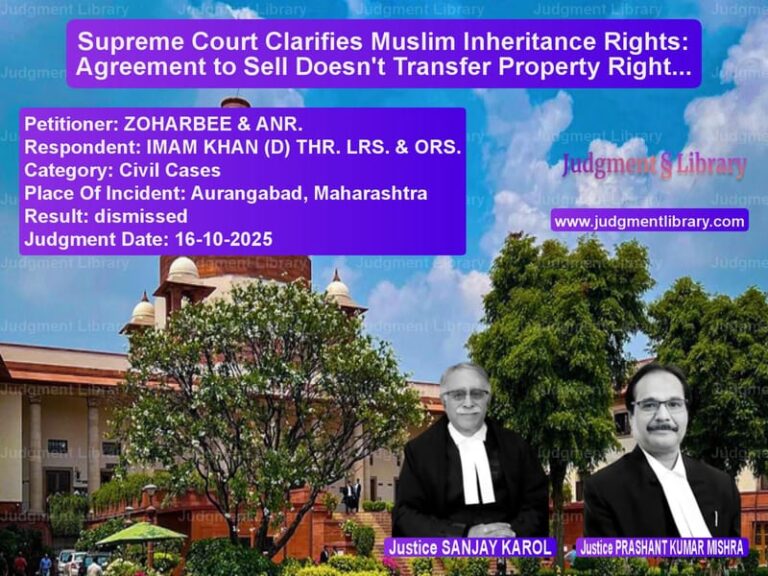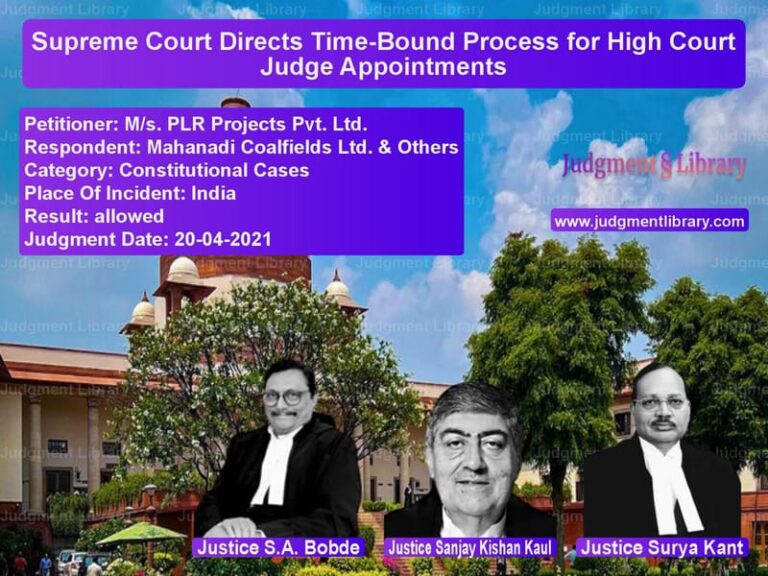Cheque Bounce Case: Supreme Court’s Ruling on Acquittal and Fair Trial Rights
The case of Christopher Raj v. K. Vijayakumar deals with the criminal liability arising under Section 138 of the Negotiable Instruments Act, 1881, commonly known as the ‘cheque bounce case.’ The Supreme Court had to determine whether the High Court was correct in convicting the accused despite his absence during the appeal proceedings.
Background of the Case
The appellant, Christopher Raj, had borrowed Rs. 30,000 from the respondent, K. Vijayakumar, on 12.08.2001. To repay this amount, he issued a post-dated cheque drawn on Kuzhithurai Canara Bank, dated 04.09.2003.
The respondent presented the cheque for collection in his Co-Operative Bank Account on 16.01.2004. However, the cheque was dishonored on 19.01.2004 due to ‘insufficient funds.’ The respondent then sent a statutory notice on 12.02.2004 to the appellant, demanding repayment. When the appellant failed to comply, the respondent filed a criminal complaint before the Judicial Magistrate No.1, Kuzhithurai.
Trial Court Proceedings
During the trial, the complainant examined two witnesses (PW-1 and PW-2) and presented Exhibits P-1 to P-7 as evidence. The appellant-accused did not present any defense evidence.
After reviewing the evidence, the trial court found that:
- The amount was borrowed in 2001, but the cheque was presented for collection only in 2004.
- The cheque was valid for six months, but it was not presented within six months from the date of borrowing the loan.
- The prosecution failed to establish that the cheque was issued for a legally enforceable debt within the validity period.
On these grounds, the trial court acquitted the accused.
High Court Proceedings
The respondent-complainant challenged the acquittal before the Madras High Court. However, the accused did not appear in the appeal proceedings.
The High Court, after hearing the complainant’s arguments, held that:
- The cheque was returned due to ‘insufficient funds’ and not because it was ‘time-barred.’
- The complainant had proved all statutory requirements under the Negotiable Instruments Act.
- The trial court’s findings were erroneous and needed to be overturned.
The High Court set aside the acquittal and convicted the appellant under Section 138 of the Negotiable Instruments Act, imposing a fine of Rs. 60,000, with a default sentence of six months’ simple imprisonment.
Petitioner’s Arguments Before the Supreme Court
The appellant contended:
- The High Court erred in deciding the appeal on merits in his absence.
- The High Court should have issued a second notice or appointed an amicus curiae (friend of the court) to argue on his behalf.
- Reversing an acquittal without providing the accused a chance to defend himself violated principles of natural justice.
Respondent’s Arguments
The complainant (respondent) did not appear before the Supreme Court. However, the Supreme Court Legal Services Committee appointed an advocate to argue on his behalf.
The respondent’s counsel contended:
- The High Court had sufficient grounds to overturn the acquittal based on the evidence on record.
- The accused had multiple opportunities to defend himself but failed to appear.
- Once a cheque is dishonored, the presumption under Section 139 of the Negotiable Instruments Act operates in favor of the complainant.
Supreme Court’s Observations
The Supreme Court noted that the appellant had not appeared in the High Court proceedings. It observed:
- “When the accused has not entered appearance in the High Court, the court should have issued a second notice or appointed an amicus curiae to represent him.”
- “The High Court ought not to have decided the criminal appeal on merits without affording an opportunity to the accused.”
- “Reversing an acquittal without giving the accused a fair hearing violates the principles of natural justice.”
Final Judgment
The Supreme Court set aside the High Court’s judgment and restored the acquittal granted by the trial court. It directed:
- The matter be remitted back to the Madras High Court for fresh consideration.
- The appellant must appear before the High Court on 26.08.2019.
- The High Court must issue notice to the respondent-complainant regarding the hearing date.
- The High Court must provide both parties with a fair opportunity to present their arguments.
Impact of the Judgment
This ruling has significant implications for criminal appeals:
- Ensures that no one is convicted in their absence without due process.
- Emphasizes the importance of appointing an amicus curiae when an accused is unrepresented.
- Protects the rights of accused individuals in cheque bounce cases.
- Establishes that reversing an acquittal requires a higher standard of judicial scrutiny.
Conclusion
The Supreme Court’s ruling reinforces the fundamental right to a fair trial. It underscores that courts must take extra precautions before reversing an acquittal, especially when the accused is absent. This judgment ensures that accused individuals in cheque bounce cases are not unfairly convicted without being heard.
Petitioner Name: Christopher Raj.Respondent Name: K. Vijayakumar.Judgment By: Justice R. Banumathi, Justice A.S. Bopanna.Place Of Incident: Kuzhithurai, Tamil Nadu.Judgment Date: 05-07-2019.
Don’t miss out on the full details! Download the complete judgment in PDF format below and gain valuable insights instantly!
Download Judgment: Christopher Raj vs K. Vijayakumar Supreme Court of India Judgment Dated 05-07-2019.pdf
Direct Downlaod Judgment: Direct downlaod this Judgment
See all petitions in Cheque Dishonour Cases
See all petitions in Legal Malpractice
See all petitions in Bail and Anticipatory Bail
See all petitions in Judgment by R. Banumathi
See all petitions in Judgment by A. S. Bopanna
See all petitions in allowed
See all petitions in Remanded
See all petitions in supreme court of India judgments July 2019
See all petitions in 2019 judgments
See all posts in Criminal Cases Category
See all allowed petitions in Criminal Cases Category
See all Dismissed petitions in Criminal Cases Category
See all partially allowed petitions in Criminal Cases Category

